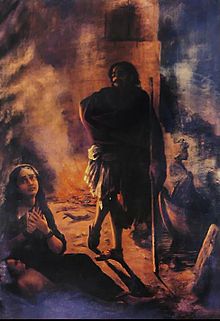Harishchandra
From Wikipedia, the free encyclopedia
For other uses, see Harishchandra (disambiguation).
|
|
This article needs additional citations for verification. (July 2008) |

Harishchandra and his family are sold into bondage and separated. Painting by Raja Ravi Varma.
Contents
The Legend of Harishchandra's ideal life
It is said that the great sage Vishwamitra, once approached Harishchandra and informed him of a promise made by the king during the sage's dream to donate his entire kingdom. Harishchandra was so virtuous, that he immediately made good his word and donated his entire kingdom to the sage and walked away with his wife and son.Since, the entire world was under the sage after he donated his kingdom, the king had to go to Varanasi, a holy town dedicated to Lord Shiva. This was now the only place outside the influence of the sage. But the sage proclaimed that for an act of donation to be completed, an additional amount as Dakshina (honorarium) had to be paid. Harishchandra, with no money in his hands, had to sell his wife and son to a Brahmin Grihastha to pay for the Dakshina. When the money collected still did not suffice for the purpose, he sold himself to a guard at the cremation ground, who was in charge of collecting taxes for the bodies to be cremated.
The king, his wife and son had to sustain tremendous hardships doing their respective chores. The king helped the guard cremate the dead bodies, while his wife and son were used as household helpers at the house of the Brahmin. Once, the son had been to the garden to pluck flowers for his master's prayer, when he was bitten by a snake and he died instantly. His mother, having nobody to sympathise for her, carried his body to the cremation grounds. In acute penury, she could not even pay the taxes needed to cremate him. Harishchandra did not recognise his wife and son. He asked the lady to sell her golden mangalasutra and pay the tax. It is at this instance that his wife recognises the man as her husband. She has a boon that her husband only could see her mangalasutra. Harishchandra then came to her and recognised her as his wife and was stung by pangs of agony.
But, Harishchandra, was dutybound by his job to perform the cremation only after the acceptance of the tax. So, he asked his wife, if she was willing to undergo further hardships and stand by him in this hour of calamity. The faithful wife readily gave assent. She had in her possession only a saree, a part of which was used to cover the dead body of her son. She offers half of her lone dress as the tax, which Harishchandra could accept and perform the last rites of his son. When she proceeded to remove her dress, miracles happened.
Lord Vishnu, Indra and all Devas and the sage Vishwamitra himself manifested themselves on the scene, and praised Harishchandra for his perseverance and steadfastness. They brought his son back to life. They also offered the king and his wife, instant places in heaven. Harishchandra refused, stating that he was bound to his master, the guard. The Devas then reveal that the guard was none other than Yama. He again refused, saying that he cannot leave behind his subjects, by Kshatriya Dharma. He asked for a place in heaven for all his subjects. But the gods refused, explaining that the subjects had their own Karma and they have to undergo them. The king was then ready to forego all his virtues and religiousness for his people, so that they could ascend to heaven leaving him behind. The gods, now immensely pleased with the unassailable character of the great king, offered heavenly abode to the king, the queen and all their subjects. The sage Vishwamitra helped to populate the kingdom again and installed Harishchandra's son as the king.
Rohitashwa was the son of Harishchandra. He founded the town of Rohtas Garh in Rohtas district, Bihar as well as Rohtak, originally Rohitakul, meaning from the Kul (family) of Rohit. Rohtagi, Rastogi, and Rustagi are descendants of Rohitashwa. They are found mostly in Bihar and UP in North India.

No comments:
Post a Comment